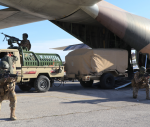You are here
Messy situation in Syria
May 03,2016 - Last updated at May 03,2016
If the Geneva talks on Syria are collapsing or are about to, the reason should not be simply found to the raging fighting in Aleppo and the atrocities committed there as a result of the intensive Syrian forces aerial bombardment of the city.
The ceasefire agreement of late February was indeed meant to prepare the ground for talks. It was also hoped that the cessation of hostilities would enable UN agencies to reach besieged areas with food and humanitarian aid.
Although the two sides did indeed head to Geneva to discuss some possible understandings, it is hard to believe that either side went to the meeting armed with adequate good faith.
Most likely, the official government delegation hoped that while negotiations take place, the Russian-backed Syrian forces would make further advances on the ground, and that would consequently improve the Assad regime’s negotiating position, if not give it the upper hand in an already lopsided equation.
The territorial losses incurred by the opposition as a result of massive Russian support for the Syrian forces left it with very limited options, amongst which continued fighting was the least promising.
They must have thought that even if the chances of getting a decent deal in Geneva were very small, attendance would at least keep them on board, if only to please their supporters.
Not many expected the ceasefire to hold. Fewer even believed that the new Geneva round could produce a political settlement of the ferocious five-year war.
Military escalation in Aleppo is partly responsible for the collapse of the US-Russian-sponsored peace talks.
That is not because what is currently happening in the besieged city is much different from what has been happening everywhere in Syria for years. I need not remind of the horrifying figures of the dead, displaced, refugees, all together, as such figures are very well known worldwide.
Neither do I need to describe the massive destruction of dozens of historic Syrian cities, towns and unique locations.
It must be because it was difficult for the opposition leaders at the Geneva talks to continue the charade while the battle was being settled in the regime’s favour.
The ceasefire, on the other hand, was nominal. It was not real.
Its exclusion of terrorist organisations, mainly Al Nusra and Daesh, offered a bright green light to the Syrian forces and their backers to continue to fight, and they did.
These forces could attack anywhere and direct their fire at any target, claiming they were combating terrorists, and that is what they have been doing.
Under the ceasefire, Syrian government forces were able to recover large swathes of territory. They kept their campaign on full gear to recover more.
From the point of view of the Assad regime, the battle for Aleppo must be decisive. That explains the ferocity of the bombing campaign, as well as the indifference of both the Syrians and the Russians to worldwide appeals to stop the carnage.
Hopes were often raised that the crisis was close to a breakthrough, that finally there was agreement between the two main influential powers, the US and Russia, on some kind of roadmap for a political settlement.
There is no question that such agreement, however vague, indeed exists. The problem is that the situation seems to be far too complicated for anyone to control, again assuming the existence of good faith.
Apparently, neither side has given up on the possibility of winning the war, even if partially.
Not until the crisis exits this stage should one expect either side in Geneva to compromise sufficiently to engage in meaningful discussion.
How long that will take, how many more human losses and suffering, how much more destruction and how many more billions of dollars will be wasted in vain remains to be seen.
Wars are cruel. They take their time until they reach exhaustion. Wars do not submit to any logic. Like fires, they stop when they have burnt everything.
But the case for the Syrian war is even graver as many outsiders constantly feed the fire.
How could it end with so much oil poured on it?
The paradox in Syria is the blurred lines between the war makers and peacemakers. We might have to wait for much longer than expected for peace in Syria.













